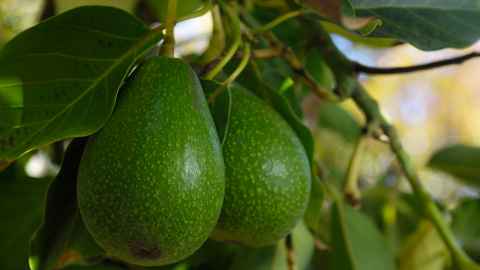Andrew Allan: new genetic technologies needed to climate-proof our crops
19 May 2023
Can our crops keep up with climate change? Professor Andrew Allan says this question should be high on New Zealand’s list of priorities.

In the fruit and produce region around Kerikeri, there are already no winter nights colder than 4°C. But chilly nights are crucial for many crops to ‘set’ the spring-flowering trigger.
“Our high-value crop industries will be hammered by the climate crisis because of warmer winters and really hot summers,” says Professor Andrew Allan from the Faculty of Science.
The rise in winter temperatures risks crops not flowering well. Poor or non-existent flowering means either no fruit or low-quality fruit. At risk is the value gained from our premium fruit crops. Think of everything we and 127 markets overseas love to eat – such as apples, avocados and kiwifruit. But climate change also takes a toll on staples like potatoes and onions.
Andrew is a professor of biological sciences at the University, and Principal Scientist at Plant & Food Research, the Crown Research Institute. He is working on a five-year $14.5m Endeavour-funded project called ‘The Flowering Crisis: Confronting a Changing Climate’s Threat to New Zealand’s Tree Crops’.
With his initial qualifications in plant biology, research has taken him from physiology to molecular biology to genomics. “I’m still basically a plant physiologist,” says Andrew.
“My area of expertise has always been in the stress response of plants to environmental conditions.”
At work he is just as likely to be in the glasshouse, examining and propagating new cultivars, as in his office. Research supporting the development of cultivars to entice new consumers had been his bread and butter, but now the challenge of climate change on crops is his focus.
“About ten years ago, my children asked: ‘Dad, what are you doing about the climate crisis?’”
He had no direct answer and realised he needed to do much more.
Nowadays, Andrew is in a race, one that takes place over decades but is no less urgent despite the time span. On one side is developing plant cultivars that can stand up to, and even flourish, in a hotter climate. On the other, dealing with the shocks and jolts to ecosystems that climate change is bringing now.
My biggest worry is, can we breed new cultivars for an altered climate and will we be quick enough?

The crops of the near future will need to withstand everything from higher temperatures to new pests and diseases that will establish themselves in a far less temperate Aotearoa New Zealand, as well as bursts of erratic weather – Cyclone Gabrielle certainly sounded a warning, wiping out apples, wine grapes, kiwifruit, kumara and many other crops.
“My biggest worry is, can we breed new cultivars for an altered climate and will we be quick enough?”
The Ministry for the Environment has produced scenarios for Aotearoa based on global models. In a best-case scenario, by 2040, the mean temperature will rise in a range between 0.7 °C and 1°C.
In a worse case, higher still. By 2090, the worst-case mean temperature rise across the country could be 3°C. Under even the best scenarios, the all-important frosts needed to set fruit will decrease by 30 percent, in the worst case by around 50 percent, by 2040.
This is a clear and present danger to an export sector that earns more than $6 billion a year or about 11 percent of the country’s annual export earnings.
But traditional plant breeding is a methodical process that takes time; up to 20 years to develop a new fruit crop that’s ready for the market.
Andrew says the only strategy to embrace is speed. “We’re going to have to be fast because the climate crisis is fast. Scientifically, we also must be fast, because that means we can publish first and discover things quickly before others do.”
There is a way to speed up the evolution of plants. Genomics is already in use in plant breeding, where researchers use markers for key genes, to know early whether attributes have been passed on to progeny.
Now, he says, New Zealand needs to grapple with the issues around gene editing. In the early years of this century, the prospect of genetically modified organisms was roundly rejected. Among the arguments against the use of genetic technology was the fear of unintended consequences and that it would damage the country’s clean and green image.
“But what does the climate crisis do to our pure, untainted image? Clean and green could end up brown and dead. This scares the hell out of me.”
We need new genetic technologies and we need to bring the New Zealand people with us, and convince them that this is safe and a good thing.
In fact, gene technologies like CRISPR, which enable very precise gene editing, have now become a common part of the toolkit in biological and medical research. Gene technology can triple or quadruple the speed with which new crop cultivars are developed, and regulations are rapidly changing overseas to allow these gene-edited crops to be grown and sold commercially.
In New Zealand, they are still classified as genetically modified, with strict regulations around their use.
In the lab, CRISPR is already being used to take out some of the repressors that stop plants from flowering when nights aren’t cold enough.
“It means the plant is not so sensitive to the reduced number of cold nights it’s experiencing. CRISPR uses an enzyme that goes into the cell and makes a variant in exactly the place you want it to. So, if you have a major gene that’s stopping flowering, you can get the CRISPR enzyme to make a variant of that gene ... and then the plant will flower more often.”
Inevitably, he says, climate change will alter everything we do. With the country’s wealth built on dairy cows, what if large herds of ruminant animals became unviable in a world beset with a rapidly changing climate?
The 2022 World Economic Global Risks Report shows that since the 1900s, 75 percent of plant genetic diversity has been lost as farmers worldwide swapped local varieties for genetically uniform, high-yielding varieties. The report says just 12 crops and five animal species now provide 75 percent of the food we produce. A lack of agricultural diversity, and biodiversity in general, contributes to climate change.
But what if, for example, the Canterbury Plains, now the home of dairy farms that are only workable due to large-scale irrigation schemes, again became a place where New Zealand grows only crops?
“Better crops feed more people,” he says. “Crops fix carbon dioxide and make the soil better.”
He says plants are a big part of the solution to many of the challenges faced by society.
“If we can make plants that are better for us, that are more attractive to eat, then we’ll eat less meat. Eating less meat is good for our health and good for the planet,” he says.
“But if we are to do this in time, we need new genetic technologies and we need to bring the New Zealand people with us, and convince them that this is safe and a good thing.”
Story by Gilbert Wong
Research Communications Editor
University of Auckland
In March 2023, Andrew was elected as a Fellow of the Royal Society Te Apārangi in recognition of more than 30 years researching plant genetics.
This story is adapted from an article on the University’s Mātātaki The Challenge website, a collection of stories about how our researchers tackle some of the world’s biggest challenges. It was adapted and updated for the Autumn 2023 edition of Ingenio magazine.